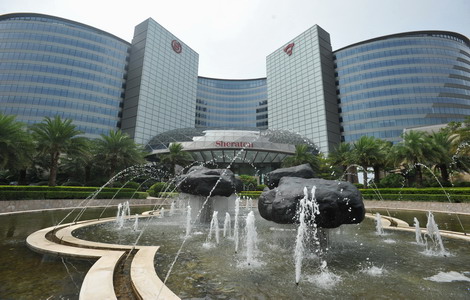Top-class resorts have room for improvement
Updated: 2012-01-02 09:45
By Tania Lee (China Daily)
|
||||||||
|
 |
|
The 5-star Sheraton hotel in Shenzhen, Guangdong province. Sheraton belongs to Starwood Hotels & Resorts Worldwide Inc, owner of nine hotel chains including the St Regis, Sheraton, Westin and W brands. The American company opened 40 hotels on the mainland in the last five years. It currently has 92 hotels in operation and another 90 in the pipeline. [Photo / China Daily] |
Tjia, an Indonesian executive who only provided his family name, takes forty business trips annually. Each time he checks into a hotel he runs through a mental checklist. Will they remember his name? Did they swap the thick blanket for the thin? Did they place his preferred toothbrush in the bathroom?
"When you spend a great deal of your time up in the air and in 5-star hotels, it's not hard to spot the differences," he said.
Hotels in Hong Kong deliver higher customer satisfaction over those on the Chinese mainland, according to Tjia. Hong Kong hotels are cleaner, have more reliable Internet, and are equipped with better gym facilities than hotels on the Chinese mainland, he said.
Since a hotel is a home away from home, more personalized services are vitally important.
"They need to be branded and up to international standards. In China, the Four Seasons, the Grand Hyatt, the Ritz and the Shangri La aren't too bad," Tjia, who is a member of each group's loyalty program, said.
Branding is also important among leisure travelers like Australian Janet Taylor, who prefers to stay at the Peninsula and has been to its hotels in Bangkok, Shanghai and Beijing.
"There's certainly a difference in the service and the slickness of everything," she said.
Last week, Taylor and her son, who is studying in the capital, traveled around China and found the service at Shangri La more than satisfactory, at least most of the time.
"They were really good in Xi'an. They were really keen to please you and help you," she said. However, the brand's hotel in another city delivered a different experience.
"We were told to go to this particular concierge in the (affiliated) business center and she was extremely rude and not at all helpful about tours and almost yelling at us and said 'Well you tell us what you want and we will see what we can do'."
International hotel operators are continuing to define their brand to compete alongside an expanding and competitive market.
One of the ways many chains expect to do this is through their food and beverage options. For example, the Westin on Beijing's Financial Street soon hopes to introduce a new Japanese restaurant.
"A good 5-star hotel will have a good restaurant so you don't have to go out," said Tjia.
The Beijing Grand Hyatt's Made In China is renowned among hotel restaurants, especially for their Peking Duck and Beggar's Chicken.
"I think you're a bit removed from daily life when you eat in a hotel. It's a bit clinical. You don't quite get the feel of the city," said Taylor, who not only expects a concierge to book travel tours but also to recommend good local restaurants.

 Relief reaches isolated village
Relief reaches isolated village
 Rainfall poses new threats to quake-hit region
Rainfall poses new threats to quake-hit region
 Funerals begin for Boston bombing victims
Funerals begin for Boston bombing victims
 Quake takeaway from China's Air Force
Quake takeaway from China's Air Force
 Obama celebrates young inventors at science fair
Obama celebrates young inventors at science fair
 Earth Day marked around the world
Earth Day marked around the world
 Volunteer team helping students find sense of normalcy
Volunteer team helping students find sense of normalcy
 Ethnic groups quick to join rescue efforts
Ethnic groups quick to join rescue efforts
Most Viewed
Editor's Picks

|

|

|

|

|

|
Today's Top News
Health new priority for quake zone
Xi meets US top military officer
Japan's boats driven out of Diaoyu
China mulls online shopping legislation
Bird flu death toll rises to 22
Putin appoints new ambassador to China
Japanese ships blocked from Diaoyu Islands
Inspired by Guan, more Chinese pick up golf
US Weekly

|

|







